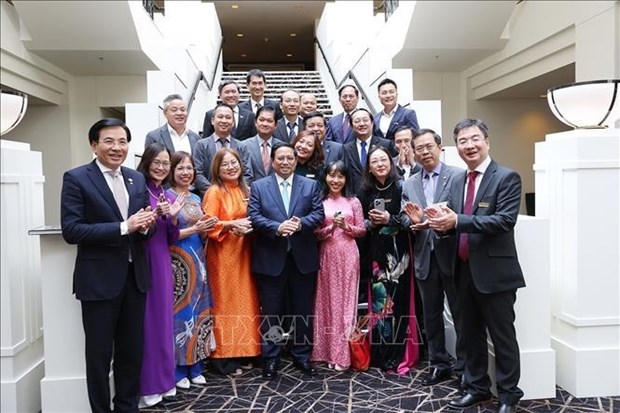 |
Prime Minister Pham Minh Chinh (front row, first from left) hears an introduction of
VASEA's research and production fields as part of the working sesion in Canberra
on March 9. (Photo: VNA) |
VASEA was formed in 2023 by gathering Vietnamese intellectual clubs across Australia. These clubs were founded in 2018, shortly after the two nations upgraded their relationship to a strategic partnership.
The association aims to leverage the knowledge and experience of its members and the network of connections with Australian scientists and experts to contribute to Vietnam’s development, particularly in such emerging fields as digital transformation, green transition, innovation, support for small- and medium-sized enterprises, and workforce training, stated VASEA Co-founder and President Professor Nghiem Duc Long from the University of Technology Sydney (UTS).
VASEA and its members can act as bridges, promoting Australian partners to provide more and better scholarships for Vietnamese students.
At the working session, PM Chinh stressed that the framework of the freshly established Vietnam-Australia comprehensive strategic partnership offers favourable conditions for the nations’ friendship associations to step up cooperation, people-to-people exchanges and contributions to the growth of the bilateral relations.
He affirmed that the Party and the State consider overseas Vietnamese an integral part of the Vietnamese community, with a desire for Vietnamese intellectuals and experts abroad to actively apply the expertise and technology acquired internationally to the specific conditions in Vietnam, promoting science, technology, and innovation and making practical contributions to the country’s development through specific programmes and projects.
The Government leader recommended VASEA to maximise the role of Vietnamese scholars and experts in Australia, further connect with Australian research institutions, training facilities and businesses, and cooperate with Vietnamese ministries and sectors to boost cooperation in the areas of science-technology, education-training, economy-trade- investment, artificial intelligence, semiconductors, deep processing of minerals, green transport, and carbon credits. Vietnam also needs support for farmers, agricultural economic development, and climate change response, especially in the Mekong Delta region, he noted.
The PM took this occasion to assign the Ministry of Education and Training to work directly with VASEA to promote bilateral engagements in human resource training. He hoped Australia will increase scholarships for Vietnam in the fields of digital transformation, green transition, circular economy, and sharing economy.
PM Chinh tasked the Ministry of Science and Technology with studying the organisation of sci-tech awards honouring overseas Vietnamese, and the Ministry of Foreign Affairs with developing a project on holding a forum for overseas Vietnamese scholars and experts in Vietnam.
 |
Prime Minister Pham Minh Chinh in a group photo with VASEA representatives
at the event. (Photo:VNA) |
The working session was the PM’s final activity in Australia. Following this event, the leader, his spouse, and a high-level Vietnamese delegation will depart Canberra for Auckland for an official visit to New Zealand from March 10 to 11./.